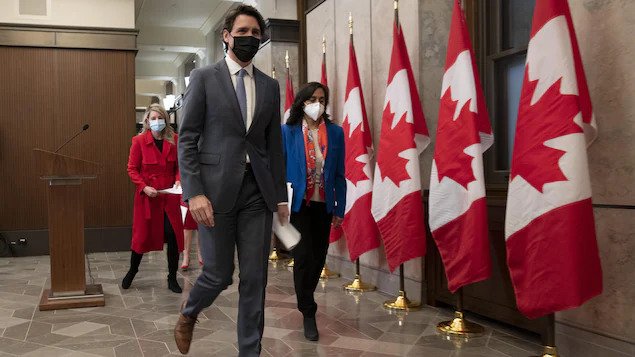Prime Minister Justin Trudeau has told his caucus he will invoke the never-before-used Emergencies Act to give the federal government extra powers to handle anti-vaccine mandate protests across the country, sources say.
Those sources, who were not authorized to speak publicly, said the prime minister informed the premiers of his decision this morning.
The Emergencies Act, which replaced the War Measures Act in the 1980s, defines a national emergency as a temporary “urgent and critical situation” that “seriously endangers the lives, health or safety of Canadians and is of such proportions or nature as to exceed the capacity or authority of a province to deal with it.”
It gives special powers to the prime minister to respond to emergency scenarios affecting public welfare (natural disasters, disease outbreaks), public order (civil unrest), international emergencies or war emergencies.
The act grants cabinet the ability to “take special temporary measures that may not be appropriate in normal times” to cope with an “urgent and critical situation” and the resulting fallout. It is still subject to the protections of the Charter of Rights and Freedoms.
Once cabinet declares an emergency, it takes effect right away — but the government still needs to go to Parliament within seven days to get approval. If either the Commons or the Senate votes against the motion, the emergency declaration is revoked.
NDP Leader Jagmeet Singh said Monday that while he sees the prime minister’s decision to turn to the Emergencies Act as “proof of a failure of leadership,” he will support the declaration — which should secure its passage through a minority Parliament.
“The reason why we got to this point is because the prime minister let the siege in Ottawa go on for weeks and weeks without actually doing anything about it, allowed the convoy to shut down borders without responding appropriately,” he said.
Legal threshold questioned
Jack Lindsay, an associate professor in the applied disaster and emergency studies department at Brandon University in Manitoba, said one of the first steps in invoking the Emergencies Act is the government showing that a state of emergency exists.
“They’re gonna have to basically prove that first hurdle, that it is a national emergency,” he said.
“He’s basically going to be arguing that these truckers are basically creating a threat to the security of Canada.”
Leah West, an assistant professor in international studies at Carleton University who has published a book on national security law, questions whether that threshold has been met.

“To invoke a national emergency, the government would need to be saying that these protests threaten the security of Canada, our sovereignty or our territorial integrity,” she said.
“I have real concerns about fudging the legal thresholds to invoke the most powerful federal law that we have.”
Errol Mendes, a professor of constitutional and international law at the University of Ottawa, sees it differently.
“If you look at what’s happened not just in Ottawa but at the Ambassador Bridge and Coutts, Alta. and in B.C., essentially we have a national emergency,” he told CBC News Network.
“You have this small group basically asking the government to do whatever they want. That’s the national security problem.”
Limits on public assembly and travel possible
Under the act, the government is prohibited from taking direct control of police forces, said Lindsay.
“They do have the grounds to regulate and prohibit public assembly and travel and then regulate or prohibit the use of specific properties,” he said.
“I suppose they could put out regulations about where semi-trailers are allowed to park overnight, for example. They can designate protected places, like the Ambassador Bridge or something.”
The government also can order or direct any person to render services with compensation, said Lindsay. That power could in theory be used to tow trucks blocking streets downtown.
In a meeting with the Liberal caucus on Monday morning, Trudeau said there were no plans to deploy the military, according to the sources.
Invoking the act also triggers an inquiry at the end of the declaration.
The move follows a meeting Sunday of the federal cabinet and its Incident Response Group, a group of key ministers convened to deal with national crises. Trudeau tweeted late Sunday that the IRG discussed “further actions the government can take to help end the blockades and occupations.”
Earlier that day, Emergency Preparedness Minister Bill Blair described the attitude in government to invoking the Emergencies Act as “appropriate caution” rather than “reticence.”
Blair told CBC’s Rosemary Barton Live it’s important to make sure that “the appropriate authorities that are with the provinces are fully utilized.” He said the federal government is “prepared to do everything necessary.”
The War Measures Act was most famously used in peacetime by Prime Minister Pierre Elliott Trudeau during the October Crisis.
JN/MS









Redes Sociais - Comentários